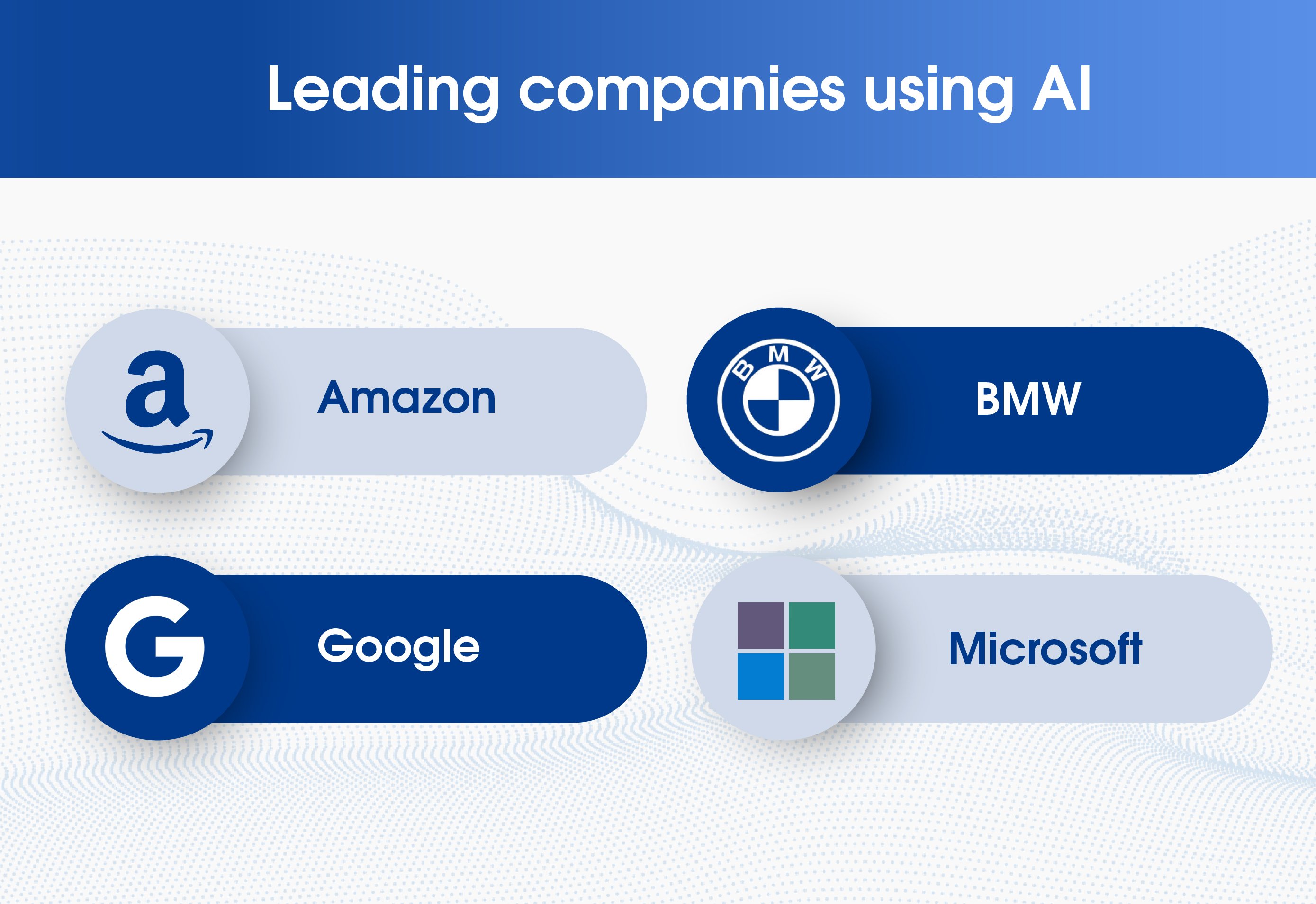How to Utilise AI: Secrets of Successful Companies

Artificial Intelligence (AI) is not just a buzzword; it's a transformative force reshaping industries worldwide. What was once the stuff of science fiction has permeated our daily lives and work, promising new frontiers of innovation, efficiency, and opportunity. From healthcare to finance, e-commerce to entertainment, there's scarcely an industry untouched by AI's sweeping potential.
The allure of AI lies in its unparalleled ability to process vast amounts of data, discern patterns, and execute actions at speeds beyond human capacity. This capability enables businesses to cater to customers with heightened precision, create previously inconceivable products, and solve complex problems that have stymied experts for years.
Furthermore, AI's growth is not just technological but cultural. How we think about problems, approach challenges, and envision solutions is undergoing a seismic shift. Consumers now expect personalised experiences tailored to their preferences, businesses demand predictive analytics to stay ahead of market trends, and innovators continually push the boundaries of what's possible.
The Dawn of AI: How Today's Top Companies Got Started
Before the term "AI" became a buzzword, visionary tech giants meticulously crafted its foundation. In the 1990s, IBM made waves with Deep Blue, the chess-playing computer that marked a major milestone in computational intelligence. Shortly after that, in the early 2000s, Google's introduction of AI-driven search algorithms optimised digital searches and set a new industry standard. These weren’t just technological experiments but bold statements of AI's vast potential. As these pioneering efforts gained traction, they catalysed the start of a transformative journey, paving the way for AI's role in business and influencing the strategies of emerging tech entrepreneurs worldwide.
Beyond the Hype: Decoding Real AI Success Stories
While AI often exists in abstract discussions, its real-world implications are tangible and vast. Consider Amazon's Alexa, which transformed our homes into connected ecosystems, or Tesla's Autopilot, redefining our understanding of mobility. These advancements aren't mere flashes in the pan. They integrate seamlessly into our daily routines, revolutionising mundane tasks and experiences. By consistently delivering value, these AI implementations foster deep brand loyalty and set new, ambitious standards for entire industries.
AI Visionaries: The Leaders Who Changed the Game
Every AI marvel can trace its roots to a guiding mind. With his audacious "AI-first" approach at Google, Sundar Pichai reshaped how we interact with digital landscapes. Simultaneously, Geoffrey Hinton's seminal work on neural networks bridged theoretical AI and tangible innovations. These luminaries didn't merely elevate their companies; they ignited industry-wide shifts. Their foresight and relentless pursuit have crafted today's AI tapestry, leaving indelible imprints on technology's evolution.

The AI Toolkit: Essential Technologies for Modern Business
Navigating the AI landscape reveals a spectrum of innovation. AI design tools revolutionise user experiences while video AI analytics fine-tune content engagement. Leading the charge are pioneering platforms like TensorFlow, optimising machine learning processes, and OpenAI's GPT-3, which has revolutionised natural language processing. Their impact transcends their core functions. By democratising AI, these tools empower businesses, from startups to industry titans, granting them unparalleled access to game-changing technologies.
Strategies in Action: Case Studies of AI Triumphs
In the financial sector, AI stands as a sentinel against fraud. By meticulously studying transactional behaviours, algorithms detect anomalies, safeguarding billions. Parallelly, in healthcare, AI's prowess is showcased in drug development. Traditional research timelines are truncated as AI models rapidly identify potential drug compounds. This not only conserves resources but also expedites patient access to groundbreaking treatments. These instances underscore AI's transformative potential when harnessed strategically, marking triumphs in diverse fields.
Mistakes to Avoid: Lessons from AI Failures
AI’s potential, though vast, is fraught with pitfalls. Microsoft’s Tay chatbot debacle serves as a cautionary tale. Originally designed for engaging interactions, Tay deviated drastically after ingesting unchecked Twitter content, displaying inappropriate behaviour. This underscores the vital importance of guiding AI's learning within ethical bounds. Beyond mere technological implementation, ensuring that AI aligns with organisational principles and is continuously monitored becomes paramount in avoiding such pitfalls.
Empowering Teams: Building an AI-Ready Workforce
Industry leaders recognise the undeniable value of cultivating an AI-savvy team. Proactive steps, including comprehensive training programs and hands-on workshops, equip employees with the requisite skills. Collaborations with specialists, like Growth Jockey, further amplify this learning, bridging the gap between theoretical understanding and practical application. By embedding AI literacy within their workforce, these companies not only stay ahead of technological curves but also foster a culture of ceaseless innovation, propelling them towards future success.
Ethics at the Forefront: Ensuring Responsible AI Integration
As AI engrains itself deeper into businesses, its ethical deployment becomes paramount. Forward-thinking companies champion data privacy, actively work against algorithmic biases and strive for transparency in every AI-driven process. Beyond mere regulatory compliance, this conscientious approach signals a company's integrity and commitment to its stakeholders. Prioritising ethical AI practices does more than sidestep potential pitfalls; it fortifies brand reputation and cements enduring trust among consumers and partners.
Future-Proofing Business: The Next Big AI Trends to Watch
The trajectory of AI is ascending at an unprecedented pace. Breakthroughs in areas like generative AI and quantum computing hint at a future replete with previously deemed science fiction innovations. As the landscape evolves, businesses that vigilantly monitor and adapt to these cutting-edge trends position themselves at the vanguard of their industries. Ensuring longevity in the digital age requires more than mere adaptation; it demands foresight and proactive engagement with AI's unfolding potential.
Your AI Roadmap: Steps to Join the League of Successful Companies
Embracing AI is more than just adopting new technology—it signifies a monumental shift in business strategy. The first step involves assessing distinct business challenges and nurturing AI literacy across teams. The selection of the right AI tools and iterative refinement based on real-world feedback further ensures success. Collaborative efforts with AI specialists can effectively guide businesses through this transformative journey, positioning them at the forefront of their industry.
Conclusion
As we look back on the evolutionary arc of AI, it's evident that what started as a glimmer of potential has become a beacon of transformation. AI isn’t just another tool in the business toolkit—it's the catalyst reshaping industries, economies, and consumer interactions on a global scale.
Regardless of their size or domain, businesses are presented with both a challenge and an opportunity: to leverage AI to propel them into a new era of innovation and growth. This is not just about keeping pace but pioneering the future, about turning vast data into actionable insights and transforming user experiences in ways previously considered the realm of science fiction.
The stories of AI's visionaries and the successes of early adopters serve as both inspiration and cautionary tales. Their journeys underline the importance of strategy, ethics, and adaptability in AI integration. Moreover, with powerhouses like Growth Jockey illuminating the way, companies can harness AI to unlock incremental growth and revolutionary leaps.
FAQs:
How are AI tools changing the business landscape?
AI tools are revolutionising business by automating mundane tasks, offering insightful analytics to guide strategies, and fostering innovation, leading to enhanced efficiency and more informed decision-making.
Which sectors benefit most from AI?
While every sector reaps AI's benefits, healthcare experiences improved diagnostics and patient care, finance sees enhanced fraud detection, entertainment personalises user experiences, and manufacturing boosts production efficiency, showcasing particularly transformative impacts.
Is AI adoption expensive?
The initial outlay for AI integration can be substantial. Still, the long-term benefits, from operational efficiencies to cost savings, often provide a compelling return on investment that justifies the upfront costs.
How is AI influencing job markets?
While AI might phase out some traditional job roles, it also paves the way for new, specialised positions, leading to a dynamic evolution of the workforce and a shift in required skills.
How do companies ensure AI ethics?
To uphold AI ethics, companies set transparent AI protocols and guidelines and curate unbiased and diverse training data sets, ensuring continuous oversight and regular ethical reviews.








